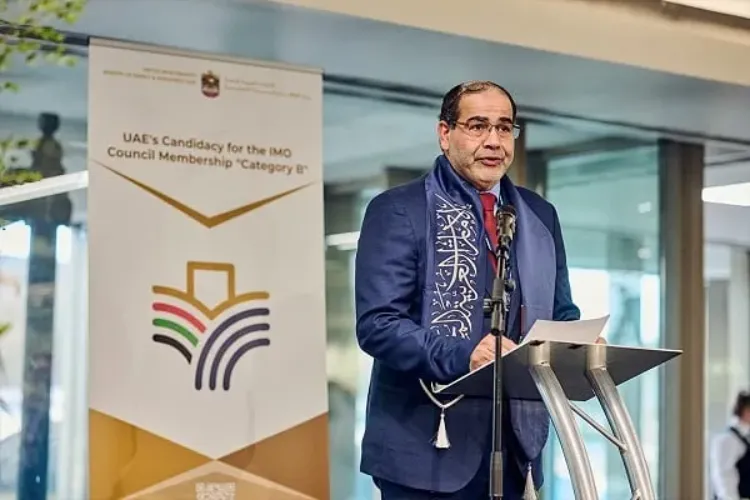
Abu Dhabi
The UAE has submitted its candidacy file for re-election to the International Maritime Organisation (IMO) Council under Category (B).
The move reaffirms the UAE's firm commitment to supporting the global maritime navigation system, enhancing the safety and security of seas, and actively participating in shaping international policies governing the maritime transport industry.
It also reflects the UAE's status as a global maritime power -- one that possesses advanced infrastructure, flexible legislation, and strategic investments that have made it a model in the fields of maritime sustainability, innovation, and good governance.
It also represents the continuation of the UAE's influential role in the organisation since joining in 1980, through its active participation in supporting international initiatives aimed at reducing emissions and promoting multilateral cooperation to ensure safer and more sustainable seas.
Suhail Mohamed Al Mazrouei, Minister of Energy and Infrastructure, affirmed that the UAE's re-nomination for membership in the IMO Council embodies the forward-looking vision of the wise leadership in strengthening the country's presence in international forums and organisations, and in actively contributing to shaping the future of the global maritime transport industry.
"The UAE today represents a global maritime hub that combines economic growth with the protection of the marine environment. We have shown a firm commitment to the highest standards of innovation and sustainability. This is supported by advanced infrastructure that is considered among the best in the world," he said.
Al Mazrouei added that the UAE's maritime sector is one of the vital drivers of the national economy, contributing more than AED135 billion to the GDP. Around 27,000 maritime companies operate in the UAE, while its national companies manage 106 ports in 78 countries, strengthening the country's position as a key hub for global trade and logistics services.
UAE ports also handle about 60 percent of the cargo movement in the Arabian Gulf region and process more than 21 million containers annually, making them highly competitive maritime centers with significant economic and strategic influence worldwide.
He pointed out that the UAE has invested in developing a network of smart ports that rank among the most advanced in the world, such as Jebel Ali Port, Khalifa Port, and Fujairah Port, which have become major hubs for global supply chains and maritime trade, as well as testbeds for implementing the latest digital transformation and artificial intelligence technologies.
He also noted that maritime sustainability lies at the heart of the UAE's vision to develop a balanced and environmentally friendly maritime sector. In line with this commitment, the country launched the Green Recycling Yards Project, the first of its kind in the region for offshore ship recycling through safe and eco-friendly methods.
Additionally, the UAE has issued regulations for the safe dismantling of ships and the provision of low-sulfur fuel, reaffirming its adherence to the standards of the MARPOL Convention. The country has also integrated maritime emission reduction into both the UAE Energy Strategy 2050 and the National Hydrogen Strategy 2050, which aim to achieve carbon neutrality by 2050.
The Minister explained that maritime safety is a top priority for the UAE. To that end, the country has established the National Maritime Navigation Centre to monitor vessel movements around the clock and launched the National Single Window for Maritime Services to streamline procedures digitally -- initiatives that have enhanced operational efficiency and reduced port waiting times.
He also pointed out that the UAE is a founding member of the Riyadh Memorandum of Understanding (MoU) on Port State Control and implements the unified port state control system, in addition to its commitment to international conventions such as SOLAS, STCW, and OPRC that strengthen maritime safety and security.
He added that this integrated framework has made the UAE a trusted maritime environment, attracting investors and reinforcing its position as a global hub for maritime trade and transport services.
Al Mazrouei emphasised that innovation is a cornerstone of the UAE's maritime sector development. The country has adopted autonomous ship technologies, digital certification, and blockchain systems in port management and integrated artificial intelligence solutions to analyze maritime data, enhance operational efficiency, and reduce emissions.
He noted that the UAE's presence within the IMO is both active and influential, as the country participates regularly in the work of its Council and technical committees, contributing to the development of global standards for safe and sustainable navigation.
The UAE has also presented several key strategic proposals, most notably the expansion of the IMO Council membership from 40 to 52 members, and the inclusion of Arabic as one of the organisation's official languages, a step that promotes cultural diversity and ensures fair participation in international decision-making.
READ MORE: Uvais Ali Khan: From an ordinary student to an inspiring mentor
"The UAE is confidently advancing on its path to becoming a global maritime power that leads the future of navigation and connects the world with responsibility, sustainability, and innovation, guided by its strategic vision, national competencies, and advanced infrastructure that stands as a model of excellence worldwide," he stated.
